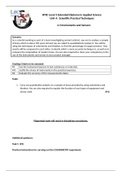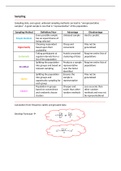Lecture 2
Governance and Strategy
Decentralisation: the citizen perspective
Details
In this lecture, we explore the decentralization of health policy as a key development in
healthcare governance. Decentralization encompasses different meanings, representing
different ideas and beliefs on local care delivery. After discussing those meanings, we shift
focus to democratic challenges and to the neighbourhood as a specific place of
decentralization. Internationally, neighbourhoods are identified as sites for innovation in
both governance and service design. The neighbourhood is promoted as the place in which
local government and other agencies can establish new routes for citizen engagement and
improved accountability. Neighbourhoods are said to enable individuals to exercise greater
‘choice’ and ‘voice’ (Lowndes and Sullivan 2008). In addition, the neighbourhood is seen as
a place where individuals are actively encouraged to live a healthier life- thus reducing
healthcare costs.
Prof Kim Putters is director of the Netherlands Institute for Social Research (SCP), which
(amongst others) studies the social consequences of decentralization of care in the
Netherlands. Furthermore, the SCP studies the role of informal care givers, and the social
capital informal care requires. What are the benefits of informal care, and at what costs? Is
informal care, as a political cornerstone of decentralization, sustainable?
Targets for this meeting
• Students are able to explain the concepts of decentralization and neighbourhood
governance.
• Students are able to explain the connection between the decentralization of health
policy and the dynamics in the neighbourhood.
• Students are able to explain the role of health inequality in the (local) design and
provision of care.
• Students are able to discuss the beliefs and disbeliefs/side effects of informal care.
• Students can explain the forms of social capital that links up with, and constitutes the
basis of informal care, as well as its conflicts.
Hybrid governance in Dutch healthcare
- Fundamental characteristics
o Private delivery
o Professional autonomy
o Public means held by private organizations
o Huge government responsibilities, limited government power
- Practical implications
o Inherent hybridity (commercial and guardian syndromes)
o Variety of public-private partnerships and networks (national and local)
1
, Trends in governance
Within the public domain (policy and politics):
- More local government (decentralization)
- More supervion and control
- More international (EU) regulations
- Trust on basis of regulation
Within the private domain (market):
- Regulated competition
- Market like management and instruments
- Trust in negotiation mechanism
Within the civil society (community):
- Mobilisation of networks
- Informal care provision
- Fragmentation of organisations
- Trust on basis of loyalty and involvement
Within the medical domain (profession):
- More focus on transparancy
- Changing concepts of health and care
- Competition and cooperation
- Trust on basis of knowledge and professional status
Decentralization
1. Political decentralization: Shifting policy making responsibility from central to local
levels.
2. Administrative decentralization: the state retains control over policy making and
political decisions, but shifts management and service delivery to lower-level
government and private organizations.
3. Fiscal decentralization: shifting fund-raising and/or expenditure responsibilities from
central to local levels.
Political decentralization
- Example: hospital care in Norway and Finland
- Fist decentralization, but still large planning role for the state
- Then; re-centralization
- It’s a balancing act or pendulum
Administrative decentralization
- Often precedes and prepares the way for political decentralization: more discretion
for public sector employees, privatization and contracting out
- Informed and inspired by: New Public Management principles
- Leads to: more hybrid organizational models (public organizations also enacting
private activities; public entrepreneurship)
Fiscal decentralization
- Necessarily related to political and administrative decentralization (but not always
the other way around)
2
Governance and Strategy
Decentralisation: the citizen perspective
Details
In this lecture, we explore the decentralization of health policy as a key development in
healthcare governance. Decentralization encompasses different meanings, representing
different ideas and beliefs on local care delivery. After discussing those meanings, we shift
focus to democratic challenges and to the neighbourhood as a specific place of
decentralization. Internationally, neighbourhoods are identified as sites for innovation in
both governance and service design. The neighbourhood is promoted as the place in which
local government and other agencies can establish new routes for citizen engagement and
improved accountability. Neighbourhoods are said to enable individuals to exercise greater
‘choice’ and ‘voice’ (Lowndes and Sullivan 2008). In addition, the neighbourhood is seen as
a place where individuals are actively encouraged to live a healthier life- thus reducing
healthcare costs.
Prof Kim Putters is director of the Netherlands Institute for Social Research (SCP), which
(amongst others) studies the social consequences of decentralization of care in the
Netherlands. Furthermore, the SCP studies the role of informal care givers, and the social
capital informal care requires. What are the benefits of informal care, and at what costs? Is
informal care, as a political cornerstone of decentralization, sustainable?
Targets for this meeting
• Students are able to explain the concepts of decentralization and neighbourhood
governance.
• Students are able to explain the connection between the decentralization of health
policy and the dynamics in the neighbourhood.
• Students are able to explain the role of health inequality in the (local) design and
provision of care.
• Students are able to discuss the beliefs and disbeliefs/side effects of informal care.
• Students can explain the forms of social capital that links up with, and constitutes the
basis of informal care, as well as its conflicts.
Hybrid governance in Dutch healthcare
- Fundamental characteristics
o Private delivery
o Professional autonomy
o Public means held by private organizations
o Huge government responsibilities, limited government power
- Practical implications
o Inherent hybridity (commercial and guardian syndromes)
o Variety of public-private partnerships and networks (national and local)
1
, Trends in governance
Within the public domain (policy and politics):
- More local government (decentralization)
- More supervion and control
- More international (EU) regulations
- Trust on basis of regulation
Within the private domain (market):
- Regulated competition
- Market like management and instruments
- Trust in negotiation mechanism
Within the civil society (community):
- Mobilisation of networks
- Informal care provision
- Fragmentation of organisations
- Trust on basis of loyalty and involvement
Within the medical domain (profession):
- More focus on transparancy
- Changing concepts of health and care
- Competition and cooperation
- Trust on basis of knowledge and professional status
Decentralization
1. Political decentralization: Shifting policy making responsibility from central to local
levels.
2. Administrative decentralization: the state retains control over policy making and
political decisions, but shifts management and service delivery to lower-level
government and private organizations.
3. Fiscal decentralization: shifting fund-raising and/or expenditure responsibilities from
central to local levels.
Political decentralization
- Example: hospital care in Norway and Finland
- Fist decentralization, but still large planning role for the state
- Then; re-centralization
- It’s a balancing act or pendulum
Administrative decentralization
- Often precedes and prepares the way for political decentralization: more discretion
for public sector employees, privatization and contracting out
- Informed and inspired by: New Public Management principles
- Leads to: more hybrid organizational models (public organizations also enacting
private activities; public entrepreneurship)
Fiscal decentralization
- Necessarily related to political and administrative decentralization (but not always
the other way around)
2










